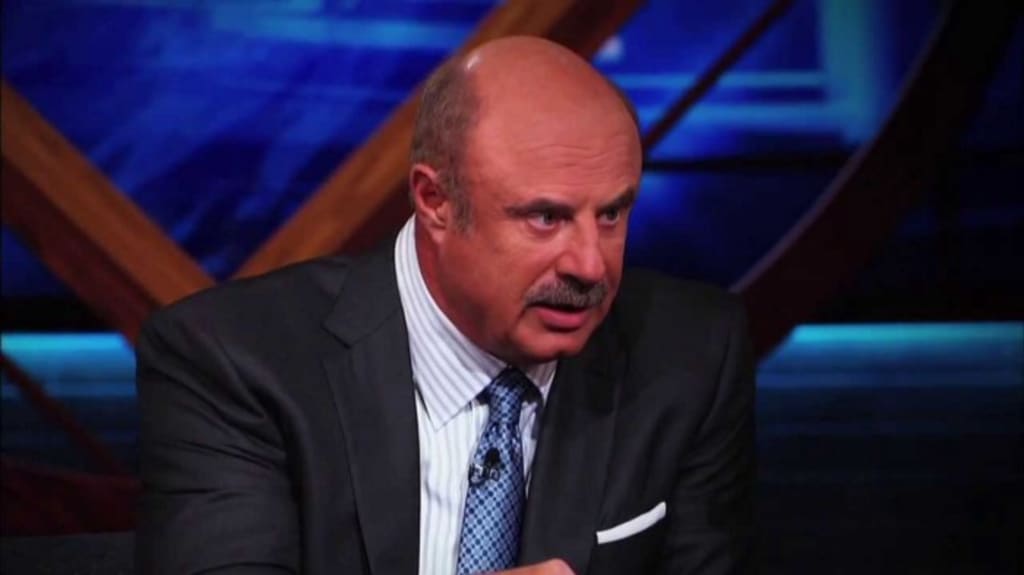The Exploitative Nature of the Dr. Phil Show
A case study in how reality television fuels the stigmatization of mental illness and addiction

In 2017, Todd Herzog, a former contestant on the reality show Survivor, opened up about his traumatic experience with Dr. Phil. Herzog won Survivor in 2007, earning $1,000,000 in prize money at just 22. After his rise to fame, he began struggling with alcoholism — prompting a visit to the Dr. Phil Show in 2013.
In a highly disturbing video clip that remains on the official Dr. Phil YouTube channel to this day, Herzog is visibly intoxicated and distressed — requiring the help of unnamed individuals as he finds a seat on an elevated platform facing both concerned family members and the studio audience.
The set-up is emblematic of the tough love approach Dr. Phil, or Phil McGraw assumes with all of his patients. McGraw’s approach to therapy often involves frank conversations with clients and their loved ones, showcasing dramatized clips detailing the specific individual’s mental health or addiction issue. There are always audible reactions from audience members, the camera sometimes panning over to catch their reactions of disgust or amusement.
After expressing his concern, McGraw administers a breathalyzer test, which predictably reveals Herzog’s high level of impairment. McGraw remarks he has never seen a patient closer to death.
While the video clip itself feigns a sense of innocent well-meaning towards Herzog, the former reality star’s experience behind-the-scenes is far more troubling.
An investigation by STAT News in collaboration with the Boston Globe revealed Herzog was not intoxicated when he arrived to the set of the show, but found a bottle of vodka in his dressing room. Likely, the alcohol was deliberately placed there to ramp up entertainment value to the detriment of Herzog’s health. Herzog also alleged a staff member gave him a Xanax to “calm his nerves.” It is common knowledge mixing Xanax and alcohol can elicit dangerous side effects — something staff on the show would have known.
Another former guest of the show alleged one of the staff urged her to purchase heroin from an “open-air drug market” for her niece. Clients battling addictions are also subject to life-threatening 48 hour detoxes on their own — which is dangerous considering recommendations from medical professionals to seek professional help while attempting to stop chronic substance use. According to Dr. Maureen Boyle, no one should ever attempt to detox without medical supervision.
Shortly after the investigation surfaced, on behalf of McGraw, Dr. Phil staff denied the allegations in an embittered statement:
The STAT article does not fairly or accurately describe the methods of the Dr. Phil show or its mission to educate millions of viewers about drug and alcohol addiction. The show does not give drugs or alcohol to its guests and any suggestions to the contrary are errant nonsense.
For the past 16 years, the Dr. Phil show has provided valuable information to viewers by telling compelling stories about people who are fighting the battle to overcome alcohol and drug addiction. Unfortunately, addicts often lash out at the very people who are trying the hardest to help them break the cycle of addiction. Although terribly unfortunate, this is an understandable part of the behavior of addicts on their journey to recovery.
This will not deter the Dr. Phil show from its commitment to educate and inform the public about the worsening epidemic of addiction.
The statement was shockingly flippant, rejecting the possibility of any further investigation into Herzog’s serious claims.
The sentiment that addicts and other mental health patients are unworthy of trust is emblematic of the very nature of the Dr. Phil show: where stigmatization of mental illness is pervasive.
According to Dr. William Miller, the professor of Psychology and Psychiatry at the University of New Mexico, these types of generalizations about addicts are more based in prejudice than fact. All people lie — especially if they will receive condemnation or punishment when telling the truth — but to suggest addicts are perpetual liars is dangerous. Allegations of abuse from addicts and mental health patients should be taken seriously and investigated, especially since these patients are often especially vulnerable.
In recent years, frank discussions about mental illness have become commonplace. Conversations about therapy, counselling, anti-depressants, anxiety and mood disorders are less unusual than they were in the past — especially amongst younger millennials and members of Gen Z. I would argue dialogues about addiction are unfortunately more taboo, though with the Opioid Crisis devastating many American cities and towns, that soon could change.
In the past, people suffering from serious mental illness and addictions were locked away in asylums and psychiatric hospitals. They were deemed “insane” and endured dehumanizing medical practices and isolation. Often, wealthy relatives of asylum patients would fund these institutions, meaning those without money could not afford mental health care — which differs little from the experience of many Americans today.
To a large extent, many individuals suffering from various mental health disorders are still pushed to the fringes of society. According to statistics gathered by The Ohio State University and Miami University, between 25 and 40% of people with mental illness in the United States will be incarcerated during their lifetimes, many of them being unable to afford medical care. Prisons are the new asylums.
However, with the increased visibility of mental health in North American popular culture, many reality television shows and other forms of media profit from the continual exploitation and stigmatization of individuals with mental illness. With this increased visibility, mental illness patients are ridiculed and pitied without receiving the proper care they need.
Dr. Phil — who isn’t a medical doctor at all but holds a doctorate in psychology — is a perfect example of this unscrutinized phenomenon.
Many of the patients on McGraw’s show are too poor to afford proper medical care, leaving them with no choice but to contact Dr. Phil’s team with heartbreaking stories of abuse, trauma, addiction and mental health disorders. As the STAT News/Boston Globe report noted, Dr. Phil’s social media pages are littered with pleas for help from many desperate individuals and families.
Subsequently, in front of millions of people from around the world, the personal conditions and circumstances of guests — including minors who are arguably too young to consent to such invasive appearances — are highlighted and scrutinized.
Even so, the Dr. Phil show remains wildly popular.
Some mentally ill guests become ridiculed memes, their disorders exploited for sheer amusement. Others — like the Black teenager who was claiming to be Caucasian and spewing anti-Black stereotypes — was revealed to be lying, fuelling the false belief that mental health patients are untrustworthy.
The Dr. Phil show thrives off controversy, which explains why Herzog was (allegedly) given drugs and alcohol before his infamous appearance. The more unusual or shocking the situation, the better.
The brief clips on the show’s YouTube channel range from people trapped in abusive relationships to unhoused people battling addictions. A recent clip shows a woman with dissociative identity disorder. These guests are vulnerable, and for McGraw to be publicizing their hardships while making millions of dollars is unethical.
The highly edited and manufactured appearances of guests fuels the overall stigmatization of mental illness and addiction by making patients objects of ridicule.
T hough the Dr. Phil show remains unhurt by allegations of abuse and the increasing criticism of McGraw’s tactics, I know its eventual end is inevitable.
When yet another allegation of abuse from Danielle Bregoli — the eighteen-year-old who gained internet notoriety after appearing on the show in 2016 — surfaced in March 2021, more questions were raised about McGraw’s intentions. Bregoli detailed the abuse she endured at just thirteen while staying at the “Turn-About Ranch,” one of McGraw’s favourite places to send his young guests.
While McGraw responded in an interview with the explanation that the show is not involved with guests when they are referred to other facilities, this contradicts Bregoli’s experience, where progress reports were sent back to the show after her appearence.
In the end, McGraw’s show will continue undeterred until we agree to stop consuming content dehumanizing and stigmatizing the suffering of the most vulnerable in our society
About the Creator
Ilana Quinn
I am a student who loves writing about history, travel, faith and life experiences. Feel free to check out more of my writing at https://linktr.ee/ilanaquinn :)






Comments
There are no comments for this story
Be the first to respond and start the conversation.